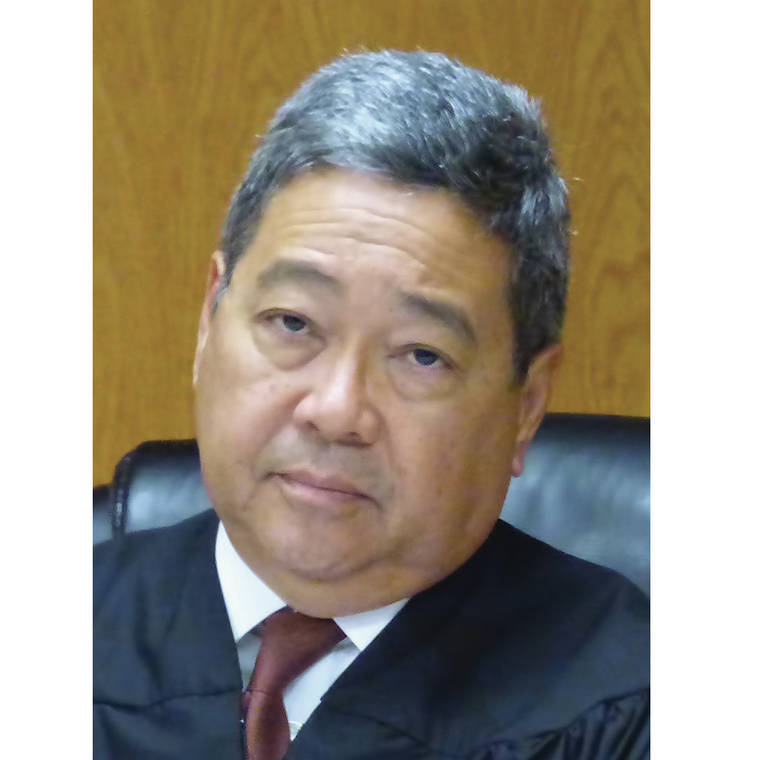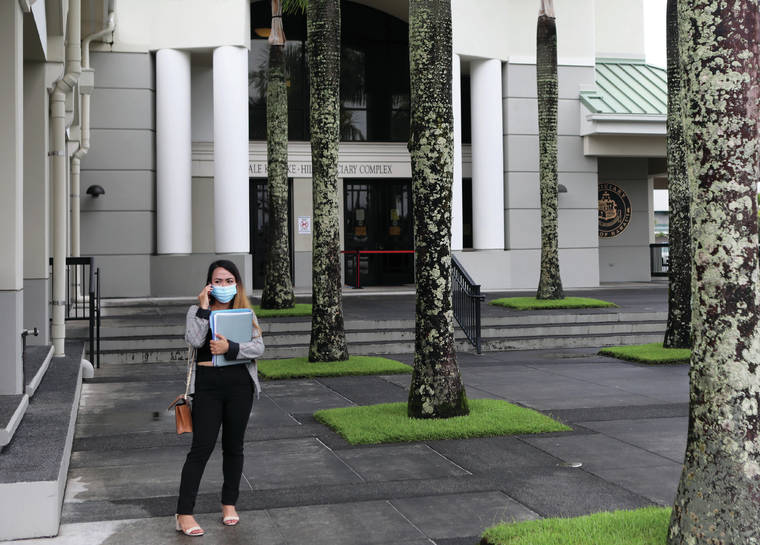The Big Island’s chief judge said there is “a lot of misperception in the community” following positive COVID-19 tests of an employee at the Waimea courthouse and a private security guard at the Hilo courthouse.
“Some people may think, well, if somebody had COVID, then you’ve got to shut down the whole court. But that’s not true,” Third Circuit Chief Judge Robert Kim told the Tribune-Herald last week.
“We work with the Department of Health, and they set out the protocols of what we need to do, and we follow it to a ‘T.’ We’re not medical experts, so we rely on the expertise of the Department of Health, who have been very responsive, proactive,” he said. “They respond immediately, whether it’s the weekend, 10 0’clock at night, whatever it is.”
Kim said the protocols the state Judiciary receives from the DOH includes “who needs to quarantine, who needs testing, (and) what needs to be cleaned.”
“In every case, whether it be the South Kohala or the Hilo case, we don’t send janitors in, we hire private companies, professionals … to extreme clean all of the areas,” Kim explained.
In the case of the South Kohala courthouse in Waimea, the decision was made to close it earlier this month after a courthouse employee there tested positive for coronavirus. That employee was asymptomatic, but was sent home to self-isolate, while all employees at the facility were directed to go home, self-quarantine and advised to monitor their health and seek advice of a medical provider, including the possibility of their own COVID-19 test.
The courthouse was deep-cleaned before being reopened to the public.
“How we can protect individuals is, first, face masks, and then, distancing. It has to be six feet,” Kim said. “But the third component regarding COVID is whether you had prolonged contact with the individual. And we’ve been informed that the individuals have to have been interacting within six feet with the (infected) individual for over 15 minutes.”
At the Hilo courthouse, the security guard, who works for a private contractor, had minimal contact with other employees and the public as they entered the building and went through the metal detector, and the courthouse remained open.
The guard — who was asymptomatic but tested positive after learning a family member had a positive rest result — left work Aug. 14 after learning about the test. The other private security guards in the courthouse contingent also were sent home, and another crew was assigned courthouse duty by the contractor, G4S Security Solutions.
As members of the public and attorneys arrive at the courthouse entrance, they are screened by a National Guard member for temperature and are asked if they’ve had a cough, have experienced shortness of breath, or have been off-island in the previous 14 days.
According to Kim, courthouse employees are subject to the same screening upon their arrival at the courthouse. Judges, who have their own entrances for security reasons, are screened by their staff.
Kim said that soon, courthouses will have thermal-screening devices similar to the ones recently installed at the state’s airports, which will automatically take the temperatures of people entering the building. He said the devices are being funded by the federal Coronavirus Aid, Relief and Economic Security Act.
Asked if the devices also have facial-recognition technology, as do the devices at the airports, the judge replied, “Yes, but we are not going to enable it.”
By order of state Chief Justice Mark E. Recktenwald, all jury trials have been postponed until at least Oct. 5, and video technology and teleconferencing are being used to do as much courtroom business as possible.
“I don’t want to discount or minimize the fear. Because we all have fear,” Kim said. “I have fear, as a judge, about COVID entering Hawaii Community Correctional Center. I have fear about it entering the courthouse.
“And so we’re taking all steps to ensure that if it does, we minimize it, control it, cap it — and protect the public, of course. And so while we’ve been very active internally about addressing the issue, I, as chief judge believe there needs to be more to inform the employees, the attorneys, the public, about what we’re doing and how we’re doing it.”
Email John Burnett at jburnett@hawaiitribune-herald.com.




